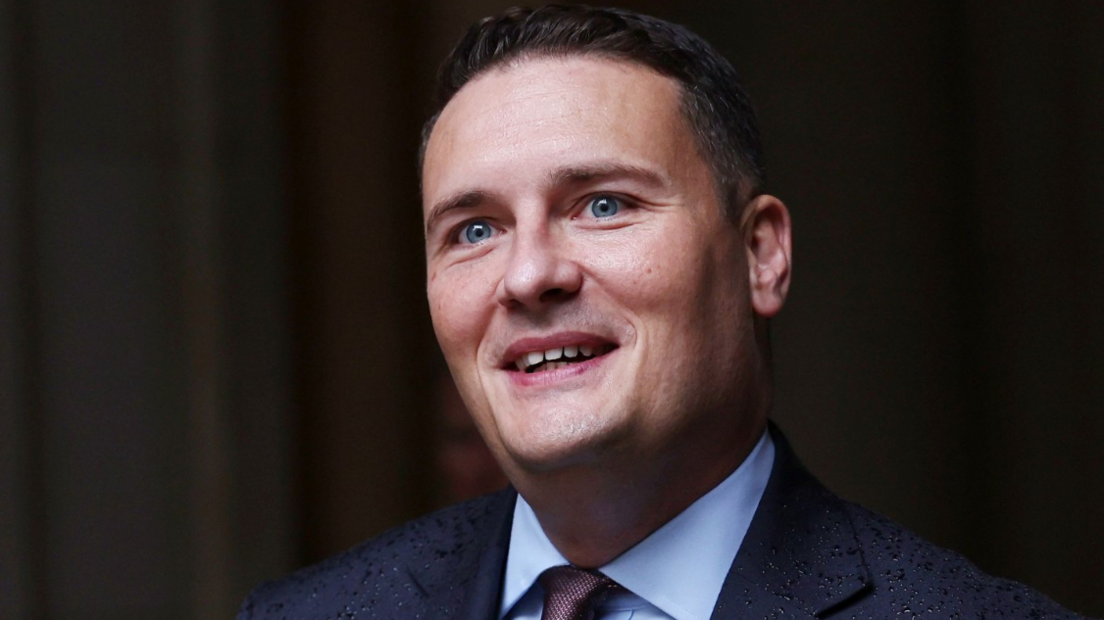Streeting will vote against assisted dying law

- Published
Health Secretary Wes Streeting will vote against changing the law on assisted dying, the BBC has confirmed.
Backbench Labour MP Kim Leadbeater has put forward a bill proposing that terminally ill adults nearing the end of their lives get the right to choose to shorten their deaths if they wish.
In a meeting of Labour MPs on Monday, Streeting said he did not believe the palliative care system was good enough to support assisted dying.
His cabinet colleague Lisa Nandy, however, has said she plans to vote for the bill when it comes before Parliament next month.
She told BBC Breakfast she had seen "too many examples of people who have no choices, and no dignity at the end of their lives".
MPs to get first vote on assisted dying for nine years
- Published4 October 2024
Assisted dying idea is dangerous, bishop warns
- Published22 October 2024
The culture secretary added: "I very much agree with Wes that we need to improve palliative care in this country, but I want people to have the choice about how they’re treated at the end of their life.”
The prime minister has said the government will remain neutral on the bill and Labour MPs will not be instructed how to vote. Other parties are expected to do the same, with the issue regarded as a matter of conscience.
A similar move was rejected by MPs in 2015, but recent polling has consistently suggested a majority of the public supports a change in the law.
Sir Keir is personally in favour of a change, but cabinet ministers have been instructed not to campaign in public on either side of the issue ahead of a vote on the Terminally Ill Adults (End of Life) Bill on 29 November.
Dozens of Labour MPs are thought to be still undecided about the plans and Streeting's intervention, first reported by The Times, external, could be especially influential because of his position as the health secretary.
It is also notable because Streeting voted for the legalisation of assisted dying the last time the Commons voted, in 2015 – meaning he has changed his mind.
Last month, he told the Financial Times he was “struggling” with the issue, saying he could “buy into the principle” of assisted dying but was “not sure as a country we have the right end-of-life care available to enable a real choice on assisted dying”.
He has also spoken of concerns about a "slippery slope" - which Archbishop of Canterbury Justin Welby has also warned of.
Dame Esther Rantzen, one of the most high-profile campaigners for a change in the law, said she was "deeply disappointed" by Streeting's stance.
The broadcaster, who has stage 4 lung cancer, told BBC Breakfast: "I've just seen too many examples of people who have no choices and no dignity at the end of their lives".
Streeting is the second cabinet minister in two days to state their intention to vote against changing the law, after Justice Secretary Shabana Mahmood told The Times of her “unshakeable belief in the sanctity and the value of human life” on Tuesday.
The pair head the two government departments, health and justice, that would be tasked with implementing any new law.
Leadbeater has said patients with serious illnesses are suffering “horrible painful deaths” and that “people deserve a choice”.
The precise detail of her proposed legislation - setting out the circumstances which could lead someone to be eligible for assisted dying - is not expected to be published until closer to the Commons debate at the end of next month.
However, Leadbeater has indicated her bill would restrict assisted dying to terminally ill patients, and insisted there is "absolutely no question of disabled people or those with mental illness who are not terminally ill being pressured to end their lives".
Concerns about 'vulnerable'
She has said there must be both medical and judicial safeguarding, so that any intervention would require two doctors and a judge to sign it off, and that she would like to see a "timeframe" on the diagnosis of patients.
But opponents say there are still serious concerns about safeguards.
Earlier this month, Baroness Tanni Grey-Thompson told the BBC she was worried about the impact on vulnerable and disabled people, as well as the possibility of coercive control and the ability of doctors to predict how long a patient has left to live.
The Archbishop met Leadbeater on Monday, but no details of their discussions were disclosed.
Assisted dying is generally used to describe a situation where someone who is terminally ill seeks medical help to obtain lethal drugs which they administer themselves.
Assisted suicide - intentionally helping another person to end their life - is currently banned in England, Wales and Northern Ireland, with a maximum prison sentence of 14 years.
The bill would cover England and Wales, where - like Northern Ireland - assisting someone to ending their life is against the law.
In Scotland - where it is not a specific criminal offence but can leave a person open to a murder charge - a bill is currently being considered that, if passed, would give terminally ill adults the right to request help to end their life.